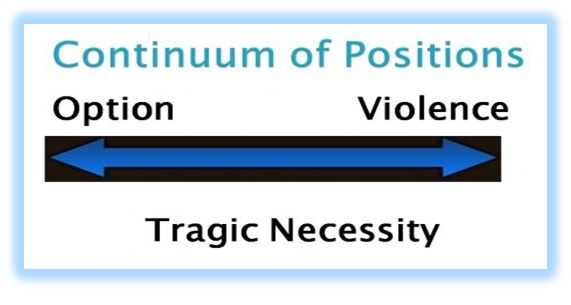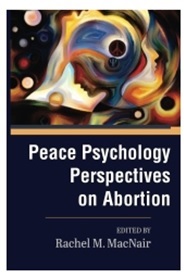Excerpt – Peace Psychology Perspectives on Abortion
Excerpt from the Introduction to Peace Psychology Perspectives on Abortion
by Rachel M. MacNair
Understanding Perspectives
Back when I was in college, pursuing a major in Peace and Conflict Studies at Earlham (a Quaker college, I being a Quaker), several of us activists put together a program to educate about what was wrong with nuclear energy. Once done, we had done so well that a student asked how it could possibly be that anyone would support it. I immediately offered a three-minute pro-nuclear diatribe. My fellow activists started getting uncomfortable, wanting me to explain what was wrong with what I was saying.
I regard this as a crucial skill for all those interested in peace and therefore in conflict resolution. For effective debating, for proper listening, for the opportunity to fashion creative solutions not otherwise thought of, for the ability to get along with people with whom one disagrees, it is important to be able to understand and articulate a view different from one’s own.
In another incident from college days, we were preparing for a program arguing against nuclear weapons. A friend said these were so horrid and dangerous that we only needed to explain this, with no further information needed. When the program came, I watched as an audience member asked this simple question: “What about the Soviets? How can we give up nuclear weapons as long as they still have them?” This was not an unusual question and should have been anticipated. Yet my friend had no answer. It is indeed important to be familiar with all points of view when the goal is to be effective in presenting one’s own. . . .
Abortion: Option, Violence, or Tragedy
The philosophical perspectives on abortion in contemporary controversies can be understood on a continuum from support to opposition, and as with most continuums more people are likely somewhere along the middle rather than at either extreme. Here we will call the two extremes abortion-as-option and abortion-as-violence, with the continuum between called abortion-as-tragic-necessity.

The term “pro-choice” is commonly used for abortion-as-option, and is insisted upon by any peace advocates who favor abortion availability. Their reasoning is for the liberation of women and perhaps also for the alleviation of poverty. Groups that favor this view include the Women’s International League for Peace and Freedom (WILPF), the War Resister’s League, and magazines of wide circulation and long history such as The Progressive and Mother Jones.
However, this extreme is also occupied by men who wish the women they impregnate to take this option whether or not the women themselves actually desire it. Similarly, there are those interested in eugenics or who take a racist attitude. For purposes of this book, we are only interested in aspects of interest to peace psychology, and therefore will not be considering the views of those whose reasoning is not for women’s benefit.
Similarly, the term “pro-life” is commonly used for the abortion-as-violence perspective, but this view is held by many for whom sensitivity to a right-to-life concern is narrow and does not extend to opposing war or capital punishment or favoring effective anti-poverty programs. This has been particularly true in recent partisan politics in several countries.
In the same way, this book is only considering the views of those who oppose all these forms of violence across the board, in what is commonly called the “consistent life ethic”. . . This view is officially held by many Catholic documents and the Mennonite church (Mennonites are a traditionally pacifist church) as well as a large number of people of varying religions and of secular orientation in the peace movement. . . .
Why the Difference?
The fact that peace advocates can be found on both sides and in the middle of the continuum has much to do with understanding the status of the human embryo and fetus.
- If the status is one of “products of conception” or tissue, then removing the growth is nothing more than ending an unwanted pregnancy, and the understanding that this is entirely a decision for the pregnant woman would be determinative; this goes with the “abortion-as-option” view.
- If the embryo or fetus has the status of a baby, a human being entitled to the rights all human beings have to be protected from being killed, then abortion is an act of violence subject to all the problems that using violence as a problem-solver commonly has, as would be understood in the “abortion-as-violence” view.
- If the embryo or fetus is understood to be a living organism but one with a status similar to an animal, then killing an animal is to be avoided when possible but allowed when really needed. Persuasive abortion reduction programs are a good idea, but not legal bans; hence, abortion-as-tragic-necessity. . . .

Left: 6-week embryo. Right: Rachel MacNair in 1985
To illustrate how these different perspectives lead to different discussions, take the impact on women’s equality. To the abortion-as-option view, it is exceedingly obvious that women having control of their own reproductive lives is foundational for women’s equality. From the abortion-as-violence perspective, telling women we must have surgery to be treated equally is disparaging female biology, and therefore a form of privileging male characteristics. From the abortion-as-option view, forcing women to continue pregnancies is itself a form of gender discrimination. From the abortion-as-violence perspective, when pregnancies are regarded as optional rather than a condition to be accommodated, then those employers and schools who understand themselves to be inconvenienced are more likely to discriminate against pregnant women.
================================
For more excerpts of this book as blog posts, see:
Excerpt – Peace Psychology Perspectives on Abortion: Wars Cause Abortion
Excerpt – Peace Psychology Perspectives on Abortion: Child Abuse

Leave a Reply